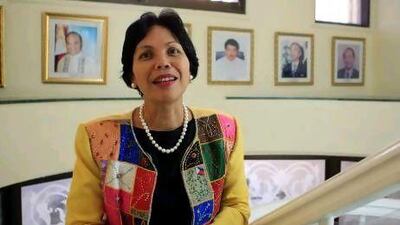ABU DHABI // Appeals for Filipino domestic staff in the UAE to be paid the minimum wage required by their government are being ignored.
Recruitment agencies say that even if they sign deals agreeing to the minimum wage, it is employers, not agents, who pay the salaries. And many employers say the US$400 (Dh1,470) a month required by the Philippine overseas employment administration is unrealistic.
“We can’t afford to pay our five domestic helpers $400 each,” said Mona, 32, a Filipina who lives with her Emirati husband and their four children in an eight-bedroom villa in Al Ain.
"We have so many expenses – a car loan, house rent and school fees. I spend Dh6,000 every month on groceries alone."
The couple have been married for 10 years and have four sons, aged 9, 7, 4 and 3. They have a cook, a cleaner, a babysitter, a female driver and a gardener, all from the Philippines. Each is paid Dh800 a month, or $218.
“Not all Emiratis are rich and can afford to pay their housemaid $400,” Mona said. “I hope the Philippine government realises this.”
But the view of the Philippine ambassador to the UAE, Grace Princesa, is: if you cannot afford it, do not employ a Filipina housemaid.
“I have to fight for $400,” the ambassador said at an event on Sunday. “What is $400 for rich people here? Please respect our laws.”
Ms Princesa said all employers must agree to pay the minimum. “We hope to come up with a uniform contract for household workers soon,” she said.
On Sunday, the Philippine Association of Manpower Agencies for UAE met recruiters in Abu Dhabi as part of its “goodwill mission” in the UAE, Kuwait and Qatar. “We are here on a mission to ensure that the household service workers’ reform package is followed,” said Madolyn Uanang, the association’s president.
"Our government is very determined to implement it.
"In the Philippines, we are suffering from suspension and cancellations of licences. Here in the UAE, agencies that do not follow Philippines recruitment rules and regulations are being blacklisted."
The reform package also requires domestic workers to be at least 23, undergo skills training, attend a seminar on language and culture, and that they should not pay any placement fees.
On Saturday, the manpower association signed a memorandum of agreement with recruitment agencies in Dubai and the Northern Emirates.
Both parties committed to follow the package and ensure that specific benefits are provided by the employer: one rest day a month, three meals a day, eight hours of uninterrupted sleep, decent sleeping quarters and the right to own and use a mobile phone.
“The agencies were very cooperative,” Ms Uanang said. “They signed the memorandum of agreement without hesitation. They also said they would police their ranks.”
But Talal Dibajeh, owner of a recruitment agency in Abu Dhabi who attended the meeting but did not sign the agreement, said: “We are not paying their salaries, the sponsors are.
“We will try our best but they will not agree to pay $400. The sponsors are saying they already provide free accommodation and can only pay $250.”
The goodwill mission of the manpower association, a member of the Coalition of Licensed Agencies for Domestic Workers, will help the Philippine government to inform recruiters and employers in the UAE that it is serious in implementing the minimum wage, said Nasser Munder, the labour attache in Abu Dhabi.
Many recruitment firms in Abu Dhabi and Al Ain signed a similar memorandum of agreement with the association, he said.
"They have to agree to a $400 minimum wage or they face blacklisting and lose their business," Mr Munder said.
"Filipinos will start applying for domestic jobs in Saudi Arabia, Jordan and Lebanon.
“They are qualified for the job and practically work 24 hours inside their employer’s home. They should be well compensated.”

